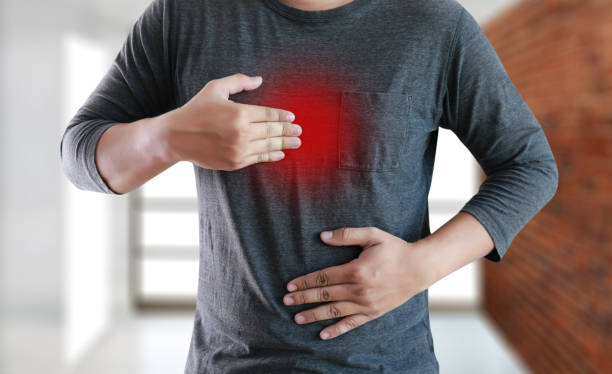Introduction:

Gastroesophageal reflux disease (GERD) is a common digestive disorder that affects millions of people worldwide. It occurs when the contents of the stomach, including acid and digestive enzymes, flow back into the esophagus, causing a range of uncomfortable symptoms. In this article, we will delve into the intricacies of GERD, exploring its symptoms, causes, and treatment options.
Symptoms of GERD:
GERD is characterized by a variety of symptoms that can vary in severity from person to person. Some of the most common signs and symptoms include:
- Heartburn: A burning sensation in the chest, often after meals or when lying down.
- Regurgitation: A sour or bitter taste in the mouth as stomach acid rises back into the throat.
- Chest pain: Discomfort or pain in the chest, which can sometimes be mistaken for a heart attack.
- Difficulty swallowing: The feeling of food sticking in the throat or chest.
- Chronic cough: A persistent cough that may worsen at night or after meals.
- Hoarseness or sore throat: Irritation or inflammation of the vocal cords and throat.
- Dental problems: Acid reflux can lead to tooth enamel erosion and oral health issues.
Causes and Risk Factors:
The primary cause of GERD is a malfunctioning lower esophageal sphincter (LES), the muscular ring at the junction of the esophagus and stomach. Normally, the LES relaxes to allow food and liquids to enter the stomach and then tightens to prevent stomach acid from flowing back up. In individuals with GERD, the LES weakens or relaxes inappropriately, leading to acid reflux.
Several factors can contribute to the development of GERD, including:
- Hiatal hernia: A condition where part of the stomach protrudes into the chest cavity through the diaphragm, weakening the LES.
- Obesity: Excess weight can put pressure on the stomach, forcing acid into the esophagus.
- Pregnancy: Hormonal changes and increased pressure on the abdomen during pregnancy can trigger GERD symptoms.
- Certain foods and beverages: Spicy foods, citrus fruits, tomatoes, chocolate, caffeine, alcohol, and fatty or fried foods can worsen symptoms.
- Smoking: Cigarette smoking weakens the LES and impairs the function of the esophagus.
- Medications: Some medications, such as nonsteroidal anti-inflammatory drugs (NSAIDs) and certain muscle relaxants, can contribute to GERD symptoms.
Treatment Options:
- Lifestyle modifications: Making certain lifestyle changes can help manage GERD symptoms. These include maintaining a healthy weight, avoiding trigger foods, eating smaller meals, not lying down immediately after eating, and elevating the head of the bed while sleeping.
- Medications: Over-the-counter antacids, such as Maalox or Tums, can provide temporary relief by neutralizing stomach acid. Proton pump inhibitors (PPIs), such as omeprazole or esomeprazole, reduce acid production and promote healing of the esophagus. H2 receptor blockers, such as ranitidine or famotidine, can also help reduce acid production.
- Surgery: In severe cases or when medications fail to alleviate symptoms, surgical intervention may be considered. Procedures such as fundoplication involve wrapping the upper part of the stomach around the LES to strengthen it and prevent reflux.
- Endoscopic procedures: Advancements in medical technology have led to minimally invasive procedures, such as endoscopic suturing or radiofrequency ablation, which can help tighten the LES and improve symptoms.
Conclusion:
GERD is a chronic condition that requires proper management to alleviate symptoms and prevent complications. If you experience persistent symptoms of acid reflux, it is important to consult with a healthcare professional for an accurate diagnosis and appropriate treatment plan. Lifestyle modifications, medications, and in some cases, surgical interventions, can significantly improve the quality of life for individuals living with GERD. By understanding the causes and available treatment options, individuals can take proactive steps towards managing their condition and enjoying a better digestive health.

